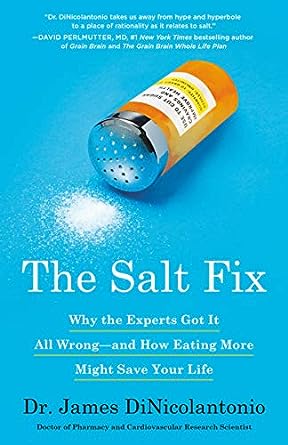|
What causes addiction? Easy, right? Drugs cause addiction. But maybe it is not that simple.
Research from Bruce K. Alexander indicates that addiction is not caused by the chemical, it is caused by the environment. The answer to addiction is not sobriety, it is connection.
1 Comment
A leading cardiovascular research scientist upends the low-salt myth, proving that salt may be one solution to—rather than a cause of—our nation’s chronic disease crises.
Sure to change the national conversation about this historically treasured substance, The Salt Fix elegantly and accessibly weaves the research into a fascinating new understanding of salt’s essential role in your health and what happens when you aren’t getting enough—with far-reaching, even heart-stopping, implications. We’ve all heard the recommendation: eat no more than a teaspoon of salt a day for a healthy heart. But there’s one big problem with this: the vast majority of us don’t need to eat low-salt diets. In fact, for most of us, more salt would be better for our health, rather than less. (Not to mention, much tastier.) Scientific research suggests that the optimal range for sodium intake is 3 to 6 grams per day (about 1 ⅓ - 2 ⅔ teaspoons of salt) for healthy adults. Now, Dr. James DiNicolantonio reveals the incredible, often baffling story of how salt became unfairly demonized—a never-before-told, century-spanning drama of competing egos and interests. Not only have we gotten it wrong, we’ve gotten it exactly backwards: eating more salt can help protect you from a host of ailments, including internal starvation, insulin resistance, diabetes, and even heart disease. (The real culprit? Another white crystal—sugar.) Dr. DiNicolantonio in The Salt Fix shows how eating the right amount of this essential mineral will help you beat sugar cravings, achieve weight loss, improve athletic performance, increase fertility, and thrive with a healthy heart. James J. DiNicolantonio, Pharm. D., is a respected cardiovascular research scientist, doctor of pharmacy at Saint Luke's Mid America Heart Institute in Kansas City, Missouri, and the associate editor of British Medical Journal's (BMJ) Open Heart. He is the author or coauthor of approximately 200 publications in medical literature. His research has been featured in The New York Times, ABC’s Good Morning America, TIME, Fox News, U.S. News and World Report, Yahoo! Health, BBC News, Daily Mail, Forbes, National Public Radio, and Men’s Health, among others. |
The Awareness domain contains research, news, information, observations, and ideas at the level of self in an effort to intellectualize health concepts.
The Lifestyle domain builds off intellectual concepts and offers practical applications.
Taking care of yourself is at the core of the other domains because the others depend on your health and wellness.
Archives
May 2024
Categories
All
|


 RSS Feed
RSS Feed

